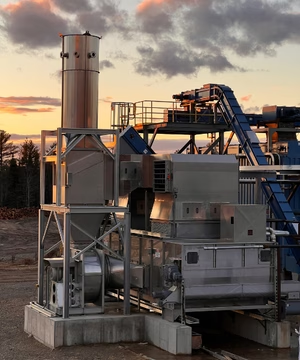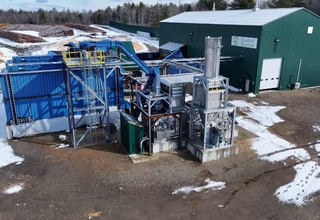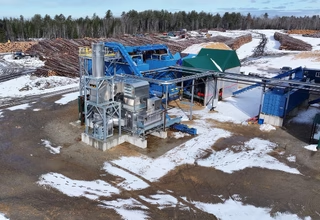A fast-track drying solution that helped a Maine biochar start-up stay on schedule
Challenge:
Standard Biocarbon (SBC), a biochar start-up in Enfield, Maine, faced an urgent challenge. The company’s project timeline was delayed, and the dry feedstock originally planned for production was no longer available. To keep operations on track, SBC needed a dryer capable of handling green softwood sawmill chips from the adjacent sawmill – and they needed it fast.
Drying is a critical step in preparing the feedstock. Without it, the pyrolysis unit would waste capacity evaporating water rather than producing biochar. By ensuring moisture content stays below 20%, throughput improves and the process runs with greater stability and precision.
The task was clear: dry softwood sawmill chips from 50% moisture content down to 20%, with an evaporation capacity of 0.83 metric tons of water per hour (0.9 st/h).
Key requirements included:
Exclusive use of excess heat from the pyrolysis process, eliminating reliance on fossil fuels
A system that could be expanded to handle greater throughput as the business grows
Reliable outdoor operation in the harsh winter climate of Northern Maine
Seamless integration with Pyreg pyrolysis units, which provide the necessary heat
STELA Solution:
STELA supplied a BTLU 1/3000-6 1/1 low-temperature belt dryer, engineered to meet SBC’s specific requirements. The dryer recirculates a variable portion of the drying air. This adjustable ratio improves heat efficiency in winter, while in summer the single-pass (BT mode) airflow allows larger amounts of heat from the pyrolysis process to be used for drying.
By running exclusively on recovered heat from the pyrolysis process, the dryer operates at just 900 kW (3.1 MMBTU/h) of thermal energy input. This ensures an energy-efficient, fuel-free process that supports both sustainability goals and long-term cost savings.
The robust, outdoor-ready design allows the system to be installed directly in the elements, while its modular configuration ensures future capacity expansions can be made with minimal disruption.

Result:
With the installation of the STELA BTLU dryer, SBC achieved its objectives:
- Reliable drying from 50% down to 20% moisture content
- Evaporation capacity of 0.83 metric tons of water per hour (0.9 st/h)
- Energy efficiency achieved through operation solely on excess heat, with no ongoing fossil fuel inputs required. Propane is used only during start-up of the Pyreg pyrolysis unit; once running, the process is sustained by syngas and other byproducts, with surplus heat captured for drying
- Proven operational reliability under Maine’s demanding winter conditions
- Flexibility to expand throughput in the future, supported by STELA’s unique capability to extend the existing dryer rather than requiring a new unit
- Only 6 months from order to dryer delivery
- A milestone in the industry: the first fully integrated STELA belt dryer used for pyrolysis in the United States
Conclusion:
The Enfield project demonstrates how low-temperature belt drying enables sustainable biochar production under challenging conditions. By integrating seamlessly with Pyreg pyrolysis units and relying only on excess heat, STELA provided SBC with a process that combines efficiency, practicality, and resilience, setting a model for future biochar facilities.


About Standard Biocarbon
Standard Biocarbon Corporation (SBC) produces high-quality, premium biochar at its facility in Enfield, Maine. The biochar is made from sustainably harvested softwood sawmill residuals and is designed to meet the growing demand for a versatile, climate-friendly material. With applications ranging from soil improvement and carbon sequestration to industrial uses, Standard Biocarbon is advancing the bioeconomy while supporting the region’s forest products industries.
